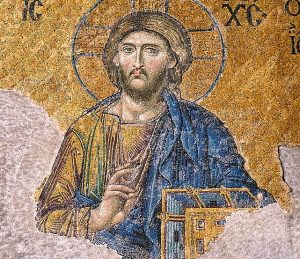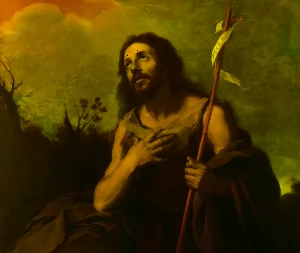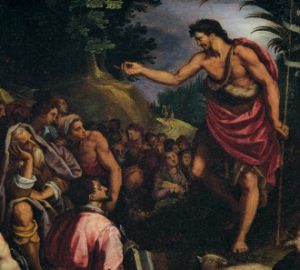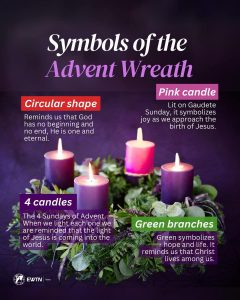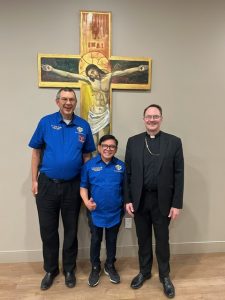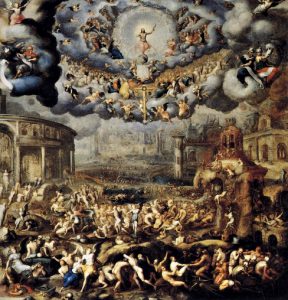Today we are in the 3rd Sunday of Advent, Year C. Every one of us is excited to truly feel the season ofChristmas. Though we are still halfway through Advent season, our mind and spirit are advanced in expectation filled with hope and joy for the many good things to come. The readings make us all rejoice to hear those inspiring words from Prophet Zephaniah, St. Paul, and from the evangelist St. Luke. Are we happy, or joyful, or is there a reason to rejoice again? Maybe we get caught up with so many distractions in love that we hardly notice God’s love and presence in our daily prayer, in the things around us, in His creation and the people who love us. Do we seek God?
God reveals Himself to us, through the scripture readings today, in order for us to overcome obstacles which hinder us from rejoicing and seeing the true light. When we find ourselves rejoicing, our joy results from God’s grace and from living in harmony with others. Each of these readings is filled with hope, joy, and peace in anticipation that something is about to happen.
The first reading from the Prophet Zephaniah brings to us a thought to ponder. After the storm and trials of the Israelites, due to their false worship of idols and disregard for the plight of the poor, there is still Goodnews. The very same God, who is furious about their waywardness, stops His troubling vengeance for He has remained faithful to His people. Fear and being disheartened have been driven away, and the victorious people are now singing and dancing with joy over God’s return.
The second reading, taken from the Letter of St. Paul to the Philippians, is a reminder to “Rejoice in the Lord always.” Anxiety will be gone if we abandon ourselves to God in peace, and our minds and hearts will be filled with God’s grace and consolation. In finding God, we find comfort and solace for there is always reason to “Rejoice!”
In today’s gospel, taken from St. Luke, the evangelist presents to us the main actor of the story, John the Baptist. John the Baptist teaches us to be fair and honest and to wait for the one who is coming. Let us reflect on certain realities that have been revealed in today’s gospel.
First, “What should we do?” This question was raised by the people to John the Baptist. We also have the same question within ourselves, to validate how we should manage to respond to John’s message of repentance! However, John the Baptist was quick with his response, that people must be sincere about fighting against the temptations of lies, extortion, greed, possessiveness and lack of concern for the poor. John’s words of exhortation prepare them for the coming of the Lord. John the Baptist tells the crowd if they have two cloaks, to give away one. These words initiate everyone to perform an act of sacrifice for others. By doing the deeds of love and justice, John’s hearers are promised to be gathered into God’s barn, to God’s all-embracing love.
Second, John said, “I am baptizing you with water.” The clarity of John’s words reveals to us his deep desire to work on purification of the hearts of the people which Jesus is expecting His people to do before His coming. We must purify our souls. Sometimes it is difficult and hurting if we are not used to doing it, that is turning away from sin and growing closer to God which requires great sacrifice and surrender. It allows us to be receptive of the recreating power of His grace to transform us.
Third, John preached Goodnews to the people. The gospel of St. Luke is continuously making John, the precursor, to labor much in preparing the people by preaching the stern warning of God for the people to repent as the center of his preaching, the “Call to Repentance.” This was so that those people would be ready for His coming. John’s preaching reminds us to be freed from the fullness of self, from being selfish towards the fullness of life. This is his mission to guarantee us for the One who is to come.
This 3rd Sunday of Advent, as we receive and ponder the readings, we are instructed to give and receive the Goodnews meant to encourage us for His coming presence of the Good and Beautiful, the God who searches for us to return to Him.
In life, we are overwhelmed by so many things that impede us to experience God around us. We can’t articulate it at times because we are out of focus. We are excited to be fascinated with temporal things rather than being immersed with the reality of God’s presence. We become like little kids who are excited with Santa Clause, rather than with the coming of Jesus. We are delighted and attracted with Christmas decor and lights and not availing ourselves to the real sense of centering on the true light, who is The Lord.
Let us find our way as we prepare for the birth of Christ. God’s gift is a relationship and His presence, which we need to give to others as a “Present,” an exchanged gift, is to share with others as well. Be kind to embrace the new plan of God for you to unleash the goodness in you. Be grateful so that anxiety may be taken out of your system, and never lose sight of God. Pray unceasingly so that you will always guard your hearts and minds. Rejoice always!
God bless you.
Fr. Arlon, osa
——————-
El Dictado del Corazón
Tercer Domingo de Adviento, Año C
- Sofonías 3:14-18a
- Isaías 12:2-3, 4, 5-6
- Filipenses 4:4-7
- Lucas 3:10-18
Hoy estamos en el Tercer Domingo de Adviento, Año C. Todos estamos emocionados por sentir verdaderamente la temporada de Navidad. Aunque aún estamos en el tiempo de Adviento, nuestra mente y nuestro espíritu van por delante, llenos de esperanza y alegría por las muchas cosas buenas que están por venir. Las lecturas nos hacen regocijarnos al escuchar esas palabras inspiradas del profeta Sofonías, de San Pablo y del evangelista San Lucas. ¿Estamos felices, alegres o hay alguna razón para regocijarnos nuevamente? Tal vez nos dejamos llevar por tantas distracciones que apenas notamos el amor y la presencia de Dios en nuestra oración diaria, en las cosas que nos rodean, en Su creación y en las personas que nos aman. ¿Buscamos a Dios?
Dios se revela a nosotros a través de las lecturas de hoy para que superemos los obstáculos del regocijo que nos impiden ver la luz. Cuando nos encontramos regocijándonos, nuestra alegría es el resultado de la gracia de Dios y de vivir en armonía con los demás. Cada una de estas lecturas está llena de esperanza, alegría y paz, anticipando que algo está por suceder.
La primera lectura del profeta Sofonías nos trae un pensamiento para reflexionar. Después de la tormenta, las pruebas de los israelitas debido a su adoración falsa de ídolos y su indiferencia hacia la situación de los pobres, llega una buena noticia. El mismo Dios que se mostró furioso por su desviación, detiene Su venganza para ser fiel a Su pueblo. El miedo y la desolación se han ido, y el pueblo victorioso ahora canta y baila de alegría por el regreso de Dios.
La segunda lectura, tomada de la carta de San Pablo a los Filipenses, es un recordatorio de “Alégrense siempre en el Señor.” La ansiedad se disipará si nos entregamos a Dios en paz; nuestras mentes y corazones se llenarán de la gracia y el consuelo de Dios. Al encontrar a Dios, encontramos consuelo, porque siempre hay una razón para “Regocijarse”.
En el Evangelio de hoy, tomado de San Lucas, el evangelista nos presenta al actor principal de la historia, Juan el Bautista. Juan el Bautista nos llama a ser justos, honestos y a esperar al que está por venir. Reflexionemos sobre ciertas realidades que se revelan en el Evangelio de hoy.
Primero, “¿Qué debemos hacer?” Esta pregunta fue planteada por el pueblo a Juan el Bautista. Nosotros también tenemos la misma pregunta dentro de nosotros, para validar cómo debemos responder al mensaje de arrepentimiento de Juan. Sin embargo, Juan el Bautista respondió rápidamente que la gente debe ser sincera al luchar contra las tentaciones de las mentiras, la extorsión, la codicia, el egoísmo y la falta de preocupación por los pobres. Estas palabras de exhortación de Juan preparan al pueblo para la venida del Señor. Juan le dice a la multitud que, si tienen dos túnicas, den una. Estas palabras instan a todos a realizar un acto de sacrificio por los demás. Al hacer obras de amor y justicia, se promete que los oyentes de Juan serán reunidos en el gran cobertizo de Dios, en Su amor abarcador.
En segundo lugar, Juan dijo: “Yo los bautizo con agua.” La claridad de las palabras de Juan nos revela su profundo deseo de trabajar en la purificación de los corazones del pueblo, algo que Jesús espera de Su pueblo antes de Su llegada. Debemos purificar nuestras almas. A veces es difícil y doloroso si no estamos acostumbrados a hacerlo, pero el alejarnos del pecado y acercarnos a Dios requiere gran sacrificio y entrega. Nos permite estar receptivos al poder recreador de Su gracia que nos transforma.
En tercer lugar, Juan predicó la Buena Nueva al pueblo. El Evangelio de San Lucas sigue haciendo que Juan, el precursor, trabaje mucho preparando al pueblo al predicar la advertencia severa de Dios para que el pueblo se arrepienta, como el centro de su predicación: el “Llamado al Arrepentimiento,” para que estén listos para la venida de Jesús. La predicación de Juan nos recuerda liberarnos de la plenitud del yo para recibir una vida que conduce a la plenitud de la vida. Esta es su misión: asegurarnos que estemos listos para Aquel que ha de venir.
En este tercer Domingo de Adviento, al recibir y meditar las lecturas, se nos instruye a dar y recibir la Buena Nueva, que nos animan a la venida de la presencia del Buen y Hermoso, el Dios que busca que regresemos a Él.
En la vida, nos vemos abrumados por tantas cosas que nos impiden experimentar a Dios a nuestro alrededor. A veces no podemos expresarlo porque estamos desenfocados. Nos emocionamos por cosas temporales en lugar de estar sumergidos en la realidad de la presencia de Dios. Nos convertimos como niños pequeños, emocionados por Santa Claus en lugar de por la venida de Jesús. Nos encanta la decoración y las luces de Navidad, pero no aprovechamos el verdadero sentido de centrarnos en la luz verdadera, que es el Señor.
Encontrémonos en el camino mientras preparamos el nacimiento de Cristo. El regalo de Dios es una relación y Su presencia, que necesitamos dar a otros como “Regalo” para el intercambio de obsequios, compartiendo este preciado don con los demás. Seamos amables y abracemos el nuevo plan de Dios para liberar lo bueno que hay en nosotros. Seamos agradecidos para que la ansiedad se aleje de nuestro ser y nunca perdamos de vista a Dios. Oremos sin cesar para que siempre guardemos nuestros corazones y mentes al regalo más grande de nuestra vida, que es Jesus.
Que Dios los bendiga.
P. Arlon, OSA


